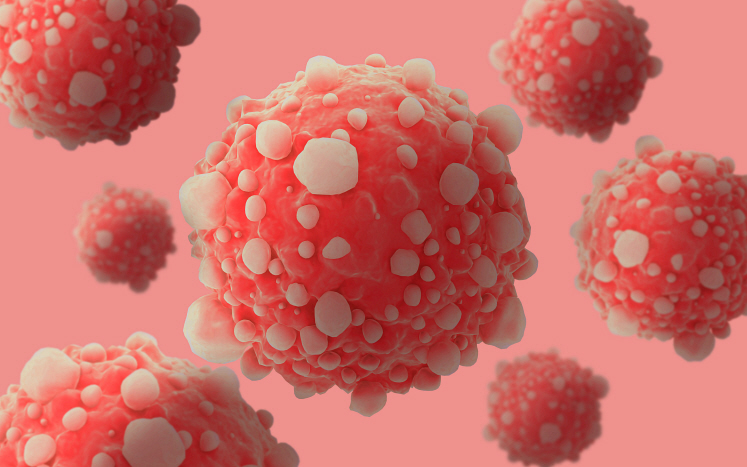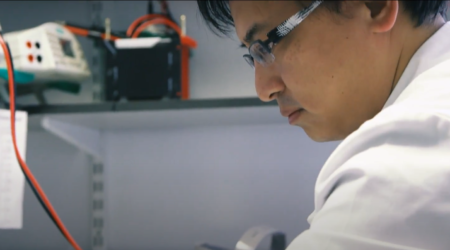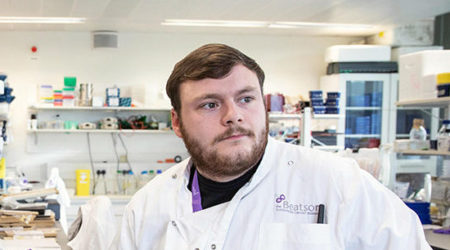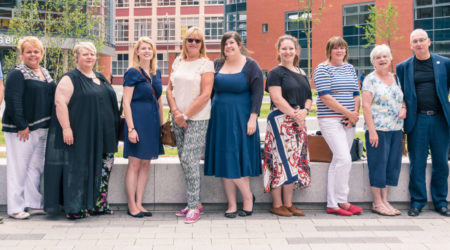
Research Innovation Fund
Truly unique and innovative research into the causes, treatment and detection of pancreatic cancer and the support for those with it
Read all about our research projects
People with pancreatic cancer desperately need earlier diagnosis, new treatments and better support, yet there hasn’t been a major breakthrough in decades.
We’re working to drive progress through our Research Innovation Fund. These awards support pilot work that are high risk but high reward – and will put the researchers in a better position to apply for larger grants to take their work to the next exciting stage.
The Research Innovation Fund scheme is rigorously reviewed on the basis of genuine innovation underpinned by sound research methods delivered by world class expertise. It can focus on any area of research relevant to people with pancreatic cancer.
Exploring the link between diabetes and pancreatic cancer
At the moment, there is no screening method for pancreatic cancer. However, previous research indicates a link between diabetes and pancreatic cancer, with over 40% of people living with the disease being diagnosed as diabetic. We don’t fully understand this link yet, but by funding vital research it is hoped that it could lead to new methods of early diagnosis for pancreatic cancer.
Watch the video below to find out more about our Research Innovation Fund and Professor Eithne Costello‘s latest research project at the University of Liverpool, which we awarded £100,000 in 2021.
Understanding the biology behind pancreatic cancer-associated diabetes
At the University of Oxford, Dr Pui San Tan and Professor Julia Hippisley-Cox have also been exploring the link between pancreatic cancer and diabetes. The team will analyse millions of anonymous GP and hospital records and use computer algorithms to understand how the link between pancreatic cancer and diabetes could become a vital clinical tool to help GPs refer patients for scans earlier. In 2021, we awarded this project £99,940.36.
Watch the video below to find out more.
Using machine learning to develop a risk tool to predict pancreatic cancer in
diabetes patients
Discover more about our latest 2021 Research Innovation Fund projects
Investigation of the stromal radiation response within the pancreatic cancer microenvironment
Recipient: Professor Jen Morton
Host Institution: Beatson Institute and University of Glasgow
Funding: £85,687.40
This team are exploring how to make radiotherapy as effective as possible for treating pancreatic cancer. So far, use of radiotherapy has been limited for the disease, but it holds huge potential to shrink the tumour enough for surgery to be an option for patients, as well as reducing chances of the cancer returning.
In the lab, the team will treat pancreatic cancer tumours with radiotherapy, and will then apply a complex analysis method called single-cell RNA sequencing to understand more about the effects it has on the surrounding cells. With this vital knowledge, they hope to then explore which drugs can be used in tandem to make this therapy as safe and effective as possible; a new treatment with the potential to save thousands of lives.
Investigating whether blocking the breakdown of genetic material prevents the progression of pancreatic cancer
Recipient: Dr Johan Vande Voorde and Dr Cassie Clarke
Host Institution: Beatson Institute, Glasgow
Funding: £73,311.45
About the study: This team have identified a specific enzyme present in the bodies of those with an aggressive form of pancreatic cancer, called UPP1. In this project, they will explore why this enzyme is present, what its role is in breaking down genetic material and therefore what happens if you target it with drugs. The presence and role of this enzyme could be crucial to the quick and uncontrollable growth of pancreatic cancer, so understanding this could create a new targeted treatment for the disease – something desperately needed for people living with it today.
Bioengineering-based targeting of immune cells in pancreatic cancer
Recipient: Dr Anguraj Sadanandam
Host Institution: Institute of Cancer Research
Funding: £99,182
About the study: Bioengineering is a fascinating discipline, blending traditional engineering with issues of healthcare. Dr Anguraj Sadanandam and his team are using their expertise in this field to explore a potential new immunotherapy treatment for pancreatic cancer. They will focus on a specific protein found surrounding pancreatic cancer tumours called ECM as the target for their innovative treatment. By developing a bioengineering platform that binds to a specific type of ECM protein found around the tumour, the team hope this will recruit immune cells from within the body to infiltrate and destroy the cancer cells. If successful, the team will overcome a major challenge in pancreatic cancer by identifying an effective immunotherapy that stops the disease progressing and improves patient survival.
Assessing the impact on carers of patients with pancreatic cancer
Recipient: Mr Sanjay Pandanaboyana
Host Institution: Freeman Hospital, Newcastle
Funding: £97,030
About the study: When someone is diagnosed with pancreatic cancer, family members and friends often assume the role of informal caregivers, which can be incredibly challenging and take a significant toll on their lives.
For the first time in the UK, this research team will be investigating the impact, needs and quality-of-life among people caring for a loved one with pancreatic cancer. The experience of 300 caregivers will be carefully analysed, with the aim of identifying key services and support that informal carers desperately need. If carers feel better supported and equipped, this can have a positive impact on the patient too, transforming their wellbeing, quality-of-life and experience living with pancreatic cancer.
The development of a metabolomic test to diagnose and quantify pancreatic exocrine insufficiency
Recipient: Mr Keith Roberts
Host Institution: University of Birmingham
Funding: £71,768
About the study: Pancreatic exocrine insufficiency (PEI) affects between 66-92% of people living with pancreatic cancer; a condition which ultimately causes the body to starve. It’s incredibly debilitating and damaging to quality of life; the effects of which can often be the difference to someone being well enough to receive life-extending treatment. The team at Birmingham hope to find a way to diagnose PEI earlier by measuring metabolites in people living with pancreatic cancer. If metabolites prove to be an effective biomarker for PEI, this simple test could mean people living with pancreatic cancer get the medicine they need earlier, helping them to survive better and longer.
Discovering novel drug targets in pancreatic cancer
Recipient: Professor Jason Carroll
Host Institution: University of Cambridge
Funding: £100,000
About the study: The cells that make up pancreatic cancer are notorious for dividing and multiplying at an uncontrollable rate, meaning the cancer can grow and spread rapidly. This team hope to understand this process better and what proteins are involved, and use this information to develop new drug targets. Professor Carroll has seen huge success in developing a brand-new technique to understand this process in breast cancer. He now hopes to translate this to pancreatic cancer and transform how the disease is treated in the future.
Find out about our ongoing Research Innovation Fund projects
Early detection of pancreatic cancer by analysing DNA taken from patient blood
Recipient: Dr Siim Pauklin
Host Institution: Botnar Research Centre at the University of Oxford
Funding: £109,986
About the study: Bringing earlier diagnosis to people with pancreatic cancer is one of the most important challenges in pancreatic cancer research and has been for decades. Despite this, we still do not have a clear indicator in the body that can be used to tell us if cancer is present or at what stage it is – a biomarker.
The team at Oxford will assess the DNA modifications that produce ‘cancer stem cells’ – one of the first steps in cancer development. Cancer stem cells are very dynamic and can, on their own, form the whole tumour as well as dictate how aggressive the cancer can become, and how resistant it will be to treatment. The team will then go on to determine if these modifications can be identified in the blood. This could result in a blood test to diagnose pancreatic cancer whilst it is in its early stages. Moreover, this work will increase the research communities understanding about basic processes in cancer cells and so could form the basis of new therapies.
Combining ultrasound and cancer specific viruses to better target and destroy pancreatic tumours
Recipient: Professor Gail ter Haar
Host Institution: The Institute of Cancer Research
Funding: £109,575 co-funded by Pancreatic Cancer UK and the Focused Ultrasound Foundation
About the study: One of the reasons that treating pancreatic cancer is so tough is because as it grows, it forms a dense, fibrous cage that encases the cancer, preventing treatments and even the body’s own defences from accessing the cancerous cells.
The team at the ICR aim to overcome this physical barrier by using two approaches. First, they have developed an ultrasound technique that will be tested to see how it affects the permeability of the pancreatic cancer tumours. The second approach is to use viruses that will target pancreatic cancer cells and initiate an immune response to kill them.
Making the tumours more permeable, will greatly enhance the effectiveness of other therapies new and old alike, ensuring that people diagnosed with pancreatic cancer have better treatment options.
Pancreatic Cancer: Individualised Supervised Exercise study
Recipient: Dr Gillian Prue
Host Institution: Queen’s University Belfast
Funding: £107,975
About the study: Surgery is the only known cure for pancreatic cancer. However, the procedure is extensive and traumatic, and along with subsequent chemotherapy results in a huge side effect burden (pain, fatigue, weight loss, bowel issues, nausea) which significantly impacts on recovery.
The team in Belfast, will build on previous studies in breast, prostate and colorectal cancer, that saw that exercising during cancer treatment can help manage many of the common symptoms such as pain, fatigue and anxiety. The team will work extensively with people affected by pancreatic cancer to design bespoke exercise programs that are tailored and sensitive to their specific side effects. This is a feasibility study that will test this approach in a small number of people. They will evaluate the data from this initial testing and then further develop and enhance the approach to be taken on a larger trial.
Understanding changes to metabolism and immune function
Recipient: Dr Claire Connell
Host Institution: Cancer Research UK Cambridge Institute
Funding: £108,000
About the study: Up to 90% of patients with pancreatic cancer suffer from cachexia – a specific type of weight loss that cannot be reversed when patients increase their calorific intake. It has a very negative impact on the patient’s quality of life and is thought to disrupt their metabolism and consequently their immune system.
Dr Connell’s team will compare data on changes in the metabolism and immune system of patients with pancreatic cancer who have cachexia with the results from those who don’t. Analysis of this data will start to give vital insight into why and how so many people with pancreatic cancer suffer from cachexia, how cachexia impacts on response to treatment and what can be done to reverse it. Therefore, this work has the potential to improve patients’ quality of life, help patients to live longer and open up possibilities of developing better treatment options.
Cutting off the energy supply to pancreatic cancer cells
Recipient: Dr Robin Ketteler
Host Institution: University College London
Funding: £109,340.68
About the study: Autophagy is used to describe the process where cells consume parts of themselves to improve their energy supply and survival. Tumour cells grow more rapidly than normal cells, meaning that they require a lot more energy than is readily available. They are therefore dependent on autophagy to fuel this need for rapid growth.
This project aims to bring together experts in autophagy and drug discovery, to work towards developing a targeted therapy that disrupts the autophagy process in pancreatic cancer. If this process can be slowed down or stopped completely, the cancer cells will die and the tumour will shrink. It is also thought that limiting autophagy will improve the effectiveness of current treatment options such as chemotherapy and radiotherapy.
Strengthening the immune system’s ability to fight pancreatic cancer
Recipient: Mr Siong-Seng Liau
Host Institution: MRC Cancer Unit at the University of Cambridge
Funding: £109,918
About the study: Immunotherapy (the Nobel prize winning technique of enhancing the body’s own immune system to fight cancer cells) has been extremely effective at treating leukaemia and breast cancer, but so far has been unsuccessful in pancreatic cancer patients. One key reason for this is because the cancerous cells, that should be susceptible to immunotherapy, ‘hide’ themselves from the patients’ immune system.
Mr Liau and his team will investigate how the cells switch of the expression of certain genes in order to ‘hide’ from the immune system. Then they will use this information to try and stop this from happening and therefore potentially remove the barrier to immunotherapy, allowing it to be used as an effective treatment for pancreatic cancer.



